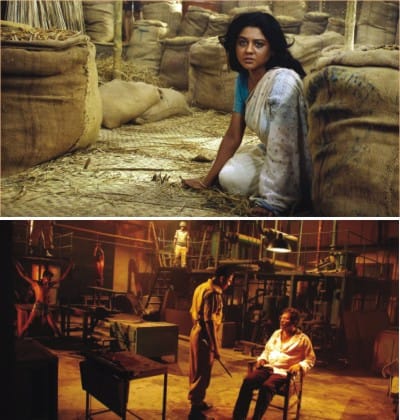Guerrilla

The nationwide release of the movie "Guerrilla" coincided with the Bengali New Year and this was done rightfully so. "Guerrilla" narrates the tale of Bilkis (played by Joya Ahsan), a freedom fighter, who actively participates in the Liberation War while searching for her lost husband. Based on Syed Shamsul Haque's novel "Nishiddho Loban", the movie also adds elements from its director Nasiruddin Yousuff's personal experiences during the war.
Initially, the premise seems simple enough; Bilkis' husband, Hasan Ahmed (played by Ferdous), who is a journalist by profession, goes missing as the war breaks out. Holding onto the belief that her husband is still alive, Bilkis scours every place for him while actively taking part in the armed resistance and continuing the publication of the magazine Guerrilla that speaks for the freedom fighters. It isn't a one-woman struggle however, as Bilkis is surrounded by a cast of powerful supporting characters -- all with the same agenda of finally ridding the country of the Pakistani occupation forces. As the movie progresses these characters are introduced and seamlessly blended into the storyline.
Where quite a few movies based on the Liberation War have not worked, "Guerrilla" succeeds, as it remarkably infuses fiction with reality. This is most evident by Ahmed Rubel's portrayal of Shaheed Altaf Mahmud, composer of "Amar Bhai-er Rokte Rangano Ekushey February". Although the role is brief, it strikes a chord with the audience, who witness Altaf's dedication to his country as he continues to unearth gems of Bengali literature in a bid to preserve them and warily refuses to compose Urdu songs despite pressure. While Bilkis plans with Altaf, the hauntingly beautiful tunes created by the composer plays in the background, moving the audience to a contradictory reverie of calm and despair.
There are other characters as well who form an integral part of the movie. Shatabdi Wadud, ATM Shamsuzzaman, and Pijush Bandyopadhaya, among others, carry out their roles convincingly, engaging the audience in this gripping narrative. Wadud deserves special praise for his portrayal of a Pakistani Major. Having almost perfected the accent, the actor presents a cardboard figure of the merciless, hard-drinking and womanising Pakistani Major. He evolves from an actor into a persona we all love to hate.
In the movie, we see Bilkis getting wrapped up in the movement, while keeping on the lookout for any news of her husband and taking care of her mother-in-law who blames Bilkis for the disappearance of Hasan till her last breath. As the two forces, the Pakistani army and the freedom fighters, attack each other and retaliate, the pressure increases to curb further damages. Matlub Sardar, essayed by ATM Shamsuzzaman, at one point becomes Bilkis' sole protector, helping her to escape as the occupation forces are alerted of her involvement. A massive man-hunt ensues and Bilkis somehow manages to escape, opting for her hometown as sanctuary.
Her brother, also a freedom fighter, is her last hope for refuge. She abandons the search for her husband temporarily and begins looking for her brother. But with a price on her head it isn't easy. As Bilkis discreetly moves towards possibly the last relative she has left, an impending sense of disaster builds up. The Pakistani army vows to hunt down Bilkis' brother and his comrades. Bilkis' return home is littered with memories of a happy yesterday, yet the familiar streets of her hometown seem alien to her. Death welcomes her; she resists and continues to move forth, determined, disgusted, disturbed yet undeterred.
The film shows the brutalities unleashed by the Pakistani army and their collaborators rather explicitly, thus does not hold back on gore and blood. Slaughter of men, rapes, torture and extreme humiliation all surface continuously. Although the random acts of intolerable violence might seem unreal to post-war generations, the filmmaker wants them to know this was the price the nation had to pay for freedom. At one point the story seems to be lost as the protagonist loses her way, but then another side of the war is revealed, that which was being fought outside the cities.
The true nature of the razakar (collaborators of the Pakistani army) is also exposed but a further dimension is added in the shape of religious extremism. As a Hindu woman is thrown off the train just because of her creed, Bilkis urges the men to oppose but no one dares. In an act of defiance Bilkis then removes her burqa, despite warnings from the passengers. This defining moment serves as a testament to the courage of not only Bilkis but the many women who sacrificed their lives for the cause.
This movie should appeal to a younger demographic, those who have not seen the war, as they get to see just how deep-rooted the movement for freedom was -- people from all walks of life uniting to free the country.
Joya's performance holds the movie together, even when the plot falters. This is yet another feather in the cap for the accomplished actor. "Guerrilla" is indeed a must-see, especially for those who are yet to face the grave realities of a period that defines our history; a history that is cruel yet tragically inspiring.

 For all latest news, follow The Daily Star's Google News channel.
For all latest news, follow The Daily Star's Google News channel. 



Comments